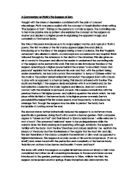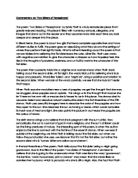Spinster- A Commentary
Spinster is a poem which juxtaposes the order and disorder of the seasons and how exactly this affects the persona’s desperation to keep control. The title ‘Spinster’ implies that the persona has a chosen a life without men, which also implies that she wants full control over her life.
Stanza one begins very formally, ‘During a ceremonious April walk/ With her latest suitor’. Lexis such as ‘ceremonious’ and ‘suitor’ creates a very formal atmosphere, therefore creating more structure, which is also implied by the use of the word ‘suitor’, which suggests very little or no feeling towards him. The stanza continues to imply that the woman can hardly stand disorder, ‘intolerably struck/ By the birds irregular babel/ And the leaves litter’. The poet uses alliteration and positive alliteration to suggest that the woman can not handle disorder with words such as ‘irregular’ and ‘litter’.
Then, in stanza two, Plath stays detached from the poem, and the whole stanza implies disorder. ‘Observed’ suggests that the woman in the poem was watching from a distance, and therefore the writing is very detached and as if a step has been taken back in order to see things as a whole. Also, the whole stanza implies disorder with lexis such as ‘unbalanced’, ‘uneven’, ‘wilderness’ and ‘disarray’, all of which suggest disarray and no order. Almost all of these words are relating to nature, ‘Through a rank wilderness of fern and flower/She judged petals in disarray’ The use of ‘rank wilderness’ implies that the female persona believes that nature, shown by the ‘fern and flower’ is dirty and scary because she does not know anything abut it, as implied by ‘wilderness’. Moreover, the poet is again detached from the poem with use of ‘judged’, which sounds like she is not involved with what is going on. The whole of this stanza is based around nature, which the persona (and therefore poet) clearly dislike as a consequence of the disorder and that it can not be predicted.

This is a preview of the whole essay
Teacher Reviews
Here's what a teacher thought of this essay
This is a good essay which demonstrates an engagement with the poem and some insightful analysis. Evidence from the poem is used throughout which enables detailed comments on Plath's choices of language. There are a few points for improvement: 1) A chronological analysis of a poem is not always the best approach. It can be better to consider various poetic techniques or aspects, such as tone and register, characterisation, setting, themes (e.g. nature), phonological features (use of sound), imagery, use of structure, and use some of these to introduce topics to analyse in detail in different paragraphs. 2) A clear plan can enable this kind of essay structure. 3) Although not always necessary, some contextual references can contribute to analysis. Plath's views on relationships might have been relevant to mention. Overall, three stars ***








